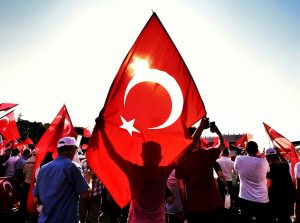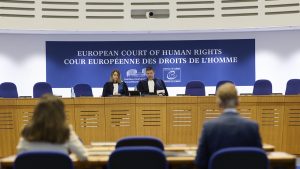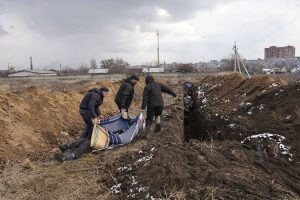By: Anjali Basdeo
Impunity Watch News Staff Writer
STRASBOURG, FRANCE- On October 8, 2024, in the case of M.A and Z.R v. Cyprus, the ECHR ruled that the Cypriot government violated the rights of Syrian refugees seeking asylum in Cyprus.
 |
M.A. and Z.R. are Syrian nationals who fled their home, Idlib, Syria, in January of 2016 for their own safety and to escape civil war. They ended up in Lebanon where they stayed in camps run by the United Nations High Commissioner for Refugees (UNHCR). While at these camps, they allege that there was no access to healthcare or employment opportunities, and they were not entitled to their basic rights. Fearing that they might be sent back to Syria, seeing as Lebanon was sending Syrians back home after the Beirut explosion of 2020, they decided to seek asylum in Cyprus.
To obtain asylum in Cyprus, M.A. and Z.R. paid smugglers $2,500 each. They had set sail in early September of 2020 on a boat with 30 other refugees. When arriving at the territorial waters of Cyprus, their boat was intercepted by the Cypriot coastguard. They were told that they could not continue their journey, even after M.A. and Z.R. explained their situation. On September 8, after 2 days of being stranded at sea under the control of the Cypriot Marine Police, they were forced onto another boat and sent back to Lebanon where the Lebanese police questioned and detained them before letting them go. As of today, M.A. and Z.R. still live in Lebanon under the UNHCR.
M.A. and Z.R. brought this suit against the Cypriot court, claiming that their refusal of asylum procedure and forcible departure back to Lebanon violated Article 3, Article 4 of Protocol No.4, and Article 13 of the European Convention on Human Rights.
The Cypriot government, on the other hand, argued that they returned M.A. and Z.R. back to Lebanon on the basis of a bilateral agreement between Cyprus and Lebanon, which provided for readmission of individuals who entered Cyprus unlawfully. The Cypriot Government contended Lebanon is a safe third country because they (1) have a good relationship with Lebanon and (2) because of the UNHCR and the presence of other UN bodies there to help refugees.
ECHR RULING
The ECHR ruled in favor of M.A. and Z.R., stating that the Cypriot government violated Article 3, Article 4 of Protocol No.4, and Article 13 of the Convention by refusing them asylum and forcibly sending them back to Lebanon without reviewing their claims and circumstances.
Violation Under Article 3
Article 3 of the Convention conveys that no person shall be subjected to degrading or inhumane treatments. The court stated that it cannot overlook the fact that M.A. and Z.R. were stranded at sea for two days under Cypriot authority just to be forcibly sent back to Lebanon without even having their asylum claims investigated.
The Court also stated that Cypriot officials should have known of the various shortcomings of the Lebanese asylum system and weighed the consequences of sending M.A. and Z.R. back. There is no evidence that the Cypriot officials assessed the ineffective asylum process or the living conditions of the asylum seekers there before sending them back. Cyprus officials knew or should have known of these conditions, yet they forced M.A. and Z.R. back to persecution without looking into their situation.
The Cypriot government also argued that they thought Lebanon was a safe third country because of their bilateral agreement with each other and the presence of UN bodies. In response, the Court reiterated that countries should not rely on others for their own refugee obligations.
Hence, under Article 3, the court ruled that Cyprus failed their refugee obligations and to follow the proper procedures for assessing asylum claims before sending M.A. and Z.R. back to Lebanon.
Violation Under Article 4 of Protocol No.4
Article 4 under Protocol No.4 prohibits the collective expulsion of aliens. Exceptions to this article only happen where this collective expulsion is done reasonably after proper examinations of the aliens in the group as individuals. Here, the Cypriot government did not investigate any claims of any of the refugees on the boat and still expelled them back to Lebanon.
The Court says that the purpose of this article is to prevent States from removing foreign nationals without first examining their circumstances. Here, the Court rules that Cyprus forcibly returning M.A. and Z.R. to Lebanon without investigating their circumstances and asylum claims falls under the definition of collective expulsion and they are thus in violation of Article 4 of Protocol No.4 under the Convention.
Violation Under Article 13
Article 13 expresses the right to an effective remedy. In the case present, the Cypriot authorities deprived M.A. and Z.R. of an effective remedy by not examining their claims and forcibly deporting them back to Lebanon. This article was read in conjunction with Article 3 and Article 4 of Protocol No. 4.
The ECHR has ruled on behalf of Syrian refugees and hold Cyprus liable for not following proper refugee procedure in examining the asylum claims of M.A. and Z.R. and forcibly sending them back to conditions that they were trying to escape.
There are many stories of Syrian refugees similar to M.A. and Z.R., where they have been refused of asylum procedures by Cypriot authorities and were forced back to Lebanon to face persecution and risk being sent back to Syria. This ruling can change the landscape of refugee rights and bring awareness to the inhumane treatments that the Cypriot government imposes on Syrian refugees seeking asylum.
For further information, please see:
ECHR- Case of M.A. and Z.R. v. Cyprus – 8 Oct. 2024
ECHR – European Convention on Human Rights – 1 Aug. 2021



